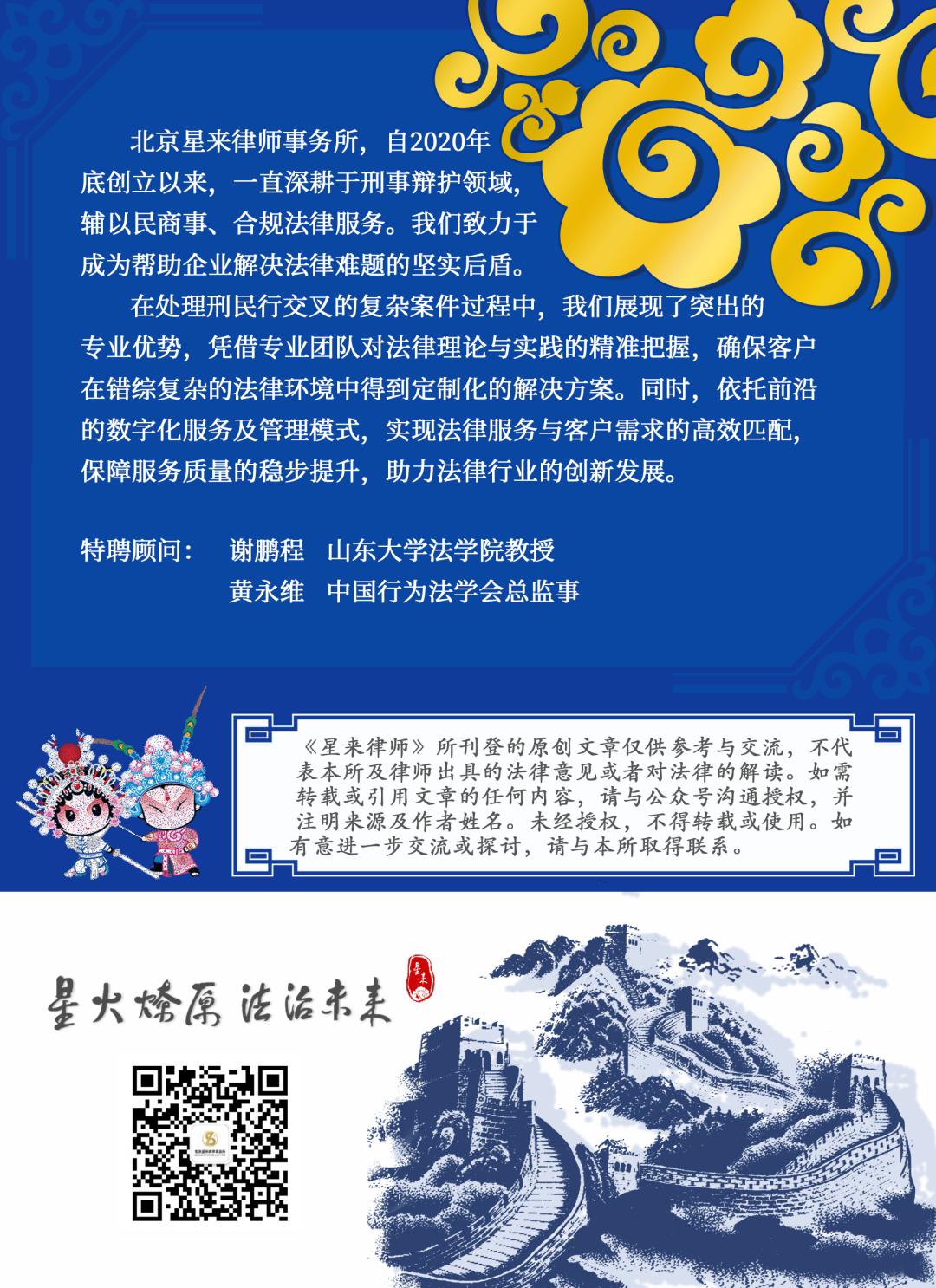
“
From philosophy to law, from lawyer to director—Wang Jun’s journey of growth has been marked by both Socratic self-reflection and groundbreaking methodological innovation. Amidst repeated moments of confusion and introspection, she continually places herself in the role of the "newcomer," famously saying, "In just a few decades, what’s the harm in giving it a try?"
At the New Forces Conference hosted by Xinze, Wang Jun, Director and Founding Partner of Beijing Xinglai Law Firm, shared her story as a "newcomer."
”
Speech | Wang Jun, Director and Founding Partner of Beijing Xinglai Law Firm
Source | NEXT New Forces Conference · Launch Event of the New Elite Legal Firms Ranking

My name is Wang Jun, and I’m the director of Xinglai Law Firm—but frankly, I’m also... "The Newcomer" Because, although I’ve been practicing law for over a decade, I’d still consider myself a novice—and even in the midst of an internship—when it comes to managing a law firm.
01
From a philosophical perspective To the law The Power of Logic
The philosopher Socrates famously said, " "Recognize Recognize "Yourself" Everyone probably already knows this—but you might not have heard his treasured, limited-edition quotes. "The top female student in the Philosophy department should become a lawyer." Grotius once said that Socrates was right, and I actually agree—it all makes perfect sense to me. That’s why, 15 years ago, I decided to start studying law. Perhaps it was my natural knack for logical thinking that helped; within just three months of self-study, I managed to pass the bar exam—and naturally, this led me straight into a new career path.
When I was in college, many classmates would ask me, "Hey, what’s your major?" and I’d reply, "Philosophy." Their typical reaction? "Huh? Philosophy?" Later, after becoming a lawyer, I’d often find myself in the same situation—colleagues would strike up conversations and ask, "Hey, what did you study in college?" When I’d say, "Philosophy," their response would always be, "Wow! Philosophy!" See? That’s exactly the kind of gap in perception we’re talking about!
Ten years ago, the first criminal case I handled independently involved a client accused of fraud amounting to over 2 million yuan—with absolutely no mitigating circumstances. As a result, the sentence he faced was firmly set to more than 10 years in prison. But I didn’t give up on this case. After sifting through the thick stack of documents, I uncovered a crucial piece of evidence pinpointing a specific time when my client clearly lacked the intent to commit fraud.
I remember that day—it was a clear, sunny afternoon after the rain. I was driving when suddenly my phone rang: it was the judge. "Lawyer Wang," he said, "the case you’ve been handling—this fraud case involving Fu Moumou—has been decided." Cautiously, I asked, "What’s the outcome? Can you tell me?" The judge didn’t hesitate at all; he simply replied, "He’s been found not guilty." Hearing those words, tears immediately welled up in my eyes, blurring my vision. But I was still behind the wheel, so instinctively, I flipped on the windshield wipers to ensure safe driving and clear visibility. Of course, even with the wipers working, my eyes remained clouded with emotion.
A not-guilty verdict—this, I believe, is every criminal defense lawyer’s dream. Have I already achieved it this early in my career? I pinch myself on the thigh and realize it’s real. I owe a debt of gratitude to Socrates.
02
Starting a Law Firm: From "Assistant" to "Director"
Five years ago, I co-founded Xinglai Law Firm alongside Zhao Yunheng, the director of the Criminal Law Committee at Dacheng Law Office. I recall that back then, Attorney Zhao Yunheng shared a nine-character mantra with me—I like to call it the "Socrates Zhao" nine-word wisdom—here it is: “You’re reliable—come work at Xinglai as the director.” Do you know what was going on in my mind at the time? "I was originally meant to be a support, but I ended up jungleing on this star—it’s all about giving it a shot and seeing what happens!" And that’s how I became who I am today.
It’s been a smooth and steady journey so far. To showcase my credentials, I even went the extra mile and dyed my gray hairs—no big patches, just one strand at a time. Little by little, I’ve managed to overcome those "stumbling blocks" on my path to maturity, like being labeled a "baby-faced" or simply "the female lawyer." In the eyes of my friends, it seems I’ve carved out a unique place for myself in the legal world. Rising star , But I said no—I’m actually seeing my white hairs rising, as if I’ve now embarked on a literal “the more white hair, the stronger” kind of power-up path.
03
The Path of Criminal Defense: Growing Through Reflection
I have a good habit— I examine myself three times a day. But when you're being overly frugal, you end up creating an accident instead. In a recent data crime case, I noticed four simple characters—“Modification Date”—in the screenshots of the evidence materials attached to the expert opinion. Do you know what this means? If an electronic file is opened and shows signs of modification before being saved and closed again, the file’s properties will automatically display “Modification Date.” In this particular case, I discovered that the “Modification Date” appeared *after* the investigative agency had already extracted the data. This clearly indicates that the agency first retrieved the data—and only then did they alter it. While we can’t see exactly what was changed, this alone serves as undeniable proof that the original evidence has been tampered with.
In court on this very issue, I grilled the expert witness so thoroughly that they were left speechless—so much so that even the judge couldn’t help but incredulously press the expert further: "Aren’t the samples used in your analysis the original documents?" The expert nodded and admitted it. I thought to myself, “Great! Now even the expert has publicly acknowledged in court that the samples aren’t the original documents. Does that mean the expert’s opinion can no longer be trusted?” After all, if the core evidence supporting the charge can’t be validated, does that mean I’m about to walk away with my second acquittal? “As always, what we can’t have seems to stir up more desire—while those who are favored grow bold and unafraid.” And frankly, right now, I feel like *I’m* the one being undeniably favored.
After a few months, the court’s verdict arrived. Sure enough, the expert opinion wasn’t accepted—right on the document, in bold letters, it simply stated, “Not Admitted.” I was thrilled, but as I kept reading, I noticed another line at the bottom of the ruling: “Based on the verbal evidence presented in this case, it can be proven that the data involved is substantial in volume.” In the end, though, the defendant was still sentenced to prison—but with one crucial twist: the judge handed down a “lenient sentence,” significantly shorter than the prosecution’s original recommendation.
This case has prompted me to deeply reflect, because in practice, very few expert witnesses actually appear in court—and even fewer are willing to openly admit in court that the evidence presented isn’t the original material. Even the most robust expert opinions, which are typically hardest to challenge, have been overturned. If this still fails to sway the outcome of a criminal case, then what else can we, as criminal defense lawyers, possibly do? Previously, I’ve always firmly believed in what Hegel once said: "Existence is justified." But is this case reasonable? I’ve been unable to let it go for a long time—I feel this case has become, for me, the very mystery of existence. After being puzzled by this existential enigma for two years, I finally realized that this philosophical question—and Not the mystery of existence not the problem, but rather The Riddle of Methodology The question.
Why do we say that? Everyone should know Professor Liu Pinxin, the renowned professor from Renmin University of China—and here’s a little spoiler: Professor Liu is now also an attorney at Xinglai Law Firm. He’s a leading expert in the field of digital evidence, and he recently handled a high-profile criminal case involving data-related crimes. Ultimately, his efforts led to the prosecution being forced to withdraw the charges, resulting in a complete acquittal for his client.
How did Professor Liu defend himself at the time? He had already Breaking through traditional defense approaches He copied nearly 2TB of digital data from the court, which now requires extensive analysis—tasks like data collision, verification and comparison of IP addresses, and more. After completing this meticulous work, he discovered that before the investigating authorities even extracted the relevant data, external entities had already planted evidence onto the defendant’s computer. What does this reveal? Clearly, it suggests that someone in this case is deliberately framing or setting up the defendant. In essence, Professor Liu is tackling the issue head-on by exposing fabricated data—using a technical approach that not only penetrates the surface but also delivers a devastating, multi-dimensional blow. Meanwhile, I’m still stuck in an endless loop of grappling with legal interpretations, which, frankly speaking, feels like a scholar trying to settle a fight while talking mostly to himself.
But since then, I’ve also had moments of reflection—about what philosophy has brought to me. Strong logical thinking It suddenly clicked for me—like the protagonist in a martial arts novel who has finally mastered the vital energy pathways. From now on, while others might still be flipping through Article X of the Criminal Law or Article Y of the Criminal Procedure Law, I’ll already be diving into line Z of the system logs. Earlier, I used to say, "Here’s what I think." But now, my go-to response is, "I checked the data—and here’s what the numbers reveal." This is a truly remarkable shift, one that’s not only compelling but also gives me a clear edge over the competition. And if a client ever asks, "Hey, are you sure about this?" I’ll calmly reply, "Not entirely—but the data speaks for itself: XXXX." So let’s stop getting lost in legal logic for its own sake—electronic data is the new battleground for criminal defense.
04
Respect the stars, respect innovation.
Socrates said, "Know thyself"; and now I’d like to say: "Know Your Data!" Perhaps the next acquittal is hidden somewhere within a line of system logs. The German philosopher Kant once famously said: "Two things fill the mind with ever-new and increasing admiration and awe—the starry heavens above me and the moral law within me." And I’d add: I admire the starry skies, but I also hold a profound reverence for the "new" void— Don't get stuck in the trap of seniority—always keep yourself feeling like the "newcomer," and you'll continually open up new possibilities.
Finally, I’d like to thank Socrates and Grotius—they’re the ones who gave me the wings of both philosophy and law. I’m also grateful to Attorney Zhao Yunheng, known as “Socrates Zhao,” whose inspiring words, “Better to die than live without innovation,” have profoundly shaped Xinglai’s culture and guided my personal growth. And special thanks go to Professor Liu Pinxin, or “Socrates Liu,” whose mentorship opened up for me the exciting new world of electronic data defense.
Yes, Just a few short decades—what’s the harm in giving it a try? I’m Wang Jun, the top female lawyer from the Philosophy Department—and a skilled attorney specializing in electronic data defense.
- The End -


Beijing Headquarters Address: Floor 17, East Section, China Resources Building, No. 8 Jianguomen North Avenue, Dongcheng District, Beijing
Wuhan Branch Office Address: Room 1001, 10th Floor, Huangpu International Center, Jiang'an District, Wuhan City, Hubei Province

Layout: Wang Xin
Review: Management Committee

Previous page
Related News


